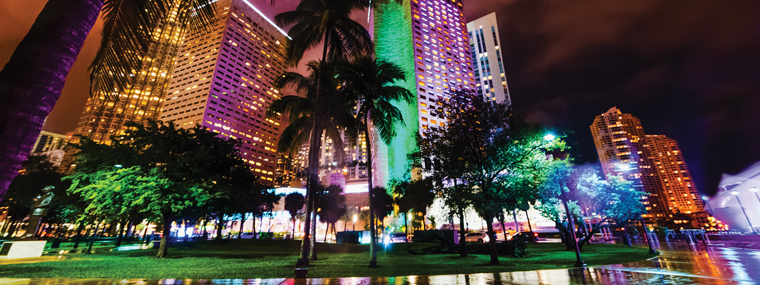
Silicon Beach
Why Miami is the USA’s New Startup Capital
By Santiago Rodriguez Tarditi / Published July 2021

Miami has a reputation that resulted from a neon hype inherited by the nightlife and entertainment scenes of the 80s and 90s, a distorted image that lived in the collective unconscious until very recently. The Magic City has gone from being a tropical melting pot of vice to a vortex of energy that’s making investors from all over the country flock to town in droves hunting for the next unicorn.
Locals cheekily proclaim that it was obvious that it was only a matter of time for this sunny and tax-advantageous metropolis (there are no income taxes in Florida) to entice investors to set up shop here—especially those looking to expand into Latin America and hoping to be conveniently located if a direct flight to Europe were ever needed. But the truth is, it was a mix of timing with happenstance—some point out a combination of a tweet that went viral and a global pandemic as the factors that accelerated it all.
On December 4th, 2020, Delian Asparouhov typed into his Twitter box: “ok guys hear me out, what if we move Silicon Valley to Miami,” to which the city’s Mayor Francis Suarez casually responded, “How can I help?” The interaction coincided with a nationwide COVID-19 lockdown that was somewhat laxer in Miami, resulting in an influx of new residents looking to escape the cold weather and instead drive to the beach while continuing to work or hire remotely.
According to an article in Inc. magazine, the Miami-Fort Lauderdale-Pompano Beach area ranked No. 16 in the U.S. for venture capital deal volume and value, with 135 deals and $1 billion invested last year through early December. This new influx has kept the local economy afloat while other cities around the country are seeing restaurants and small businesses closing (a hit that might cost the country a net loss of $3–4 trillion dollars, as estimated by the University of South California). Miami’s rent is skyrocketing, with leases in neighborhoods like Aventura rising 7.7 percent, but they’re still well below those of San Francisco or New York City, which has prompted sun-seeking investors to make the move and make Florida home.
Acting quickly to welcome this new money, Mayor Suarez appointed Melissa Krinzman of Krillion Ventures as the city’s first venture capitalist in residence, a one-year position to help manage the sudden interest and accelerated growth of Miami’s tech industry. With big names like Keith Rabois (the Silicon Valley veteran with a career at Square and Paypal) moving to the city—he recently purchased a $28M home—one can verify that the hype is becoming reality. The materialization of this new reality applies not only to titans but young businesses, too.
“When we launched five years ago, we thought that one day we would have to pack our bags and head to San Francisco to knock on some doors,” says Carlos Guzmán Laserna, CEO of ONRapp, a one-stop platform for community associations looking to improve the living experiences of all owners, residents, and management team in their community. “Some-what unexpectedly, we ended up finding a great group of angel investors that backed us up, boosting us to grow from working with 120 associations to projecting working with thousands in the next few years.” His words ring true around the city, where companies like Miami Angels move millions to fund projects that range from pet-friendly apps to exercise platforms. “It feels like all eyes are on Miami right now. Whereas before the city was seen as a good place to invest in real estate or hospitality, right now it really feels as though tech is taking center stage for the very first time,” concludes Guzmán.
This sort of competition is healthy for a metropolis that has relied too much on tourism. It’s a coming of age that has a bubbling talent pool and big names joining the game; the fact that Blackstone Group and Goldman Sachs have recently opened offices here is telling of its evolution. All it takes is a stroll across Brickell’s restaurants, Wynwood’s bars, or the Design District’s boutiques to feel this new energy/new money that’s making the city blossom anew, with places like the Magic City project of Tony Cho in Little Haiti and the new Flagler district of billionaire Moishe Mana in the works to cater to the fresh-blooded entrepreneurs looking for art, culture, creativity, and, of course, tech opportunities that shine stronger under Miami’s sun.
Santiago Rodriguez Tarditi
Writer & Environmentalist, ONRapp
Santiago Rodriguez Tarditi is a writer and environmentalist covering the intersection between technology, climate change, and social justice. He’s the editor of High on Design (Gestalten 2020) and has worked for companies including Faena, Univision, Parley, and Monocle.




